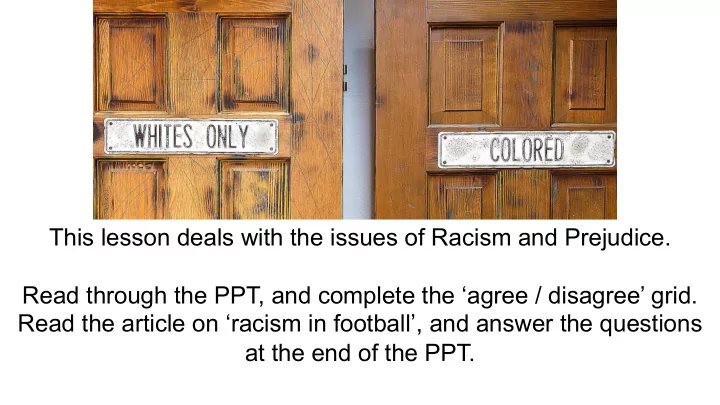

This lesson deals with the issues of Racism and Prejudice. Read through the PPT, and complete the ‘agree / disagree’ grid. Read the article on ‘racism in football’, and answer the questions at the end of the PPT.
Prejudice and Discrimination Prejudice is when a person has negative feelings about someone else without actually getting to know them. Discrimination occurs when this prejudice is put into practice, and people are treated differently. All people are different We are all unique – and it’s totally OK to notice our differences! You might be different from other people because of – • The colour of your hair, your skin or your eyes • Your height or body shape • Whether you’re a boy or a girl • Where you were born or where you live
• Your faith or religion • Your accent or the way you speak • The clothes you wear • The language you speak • Who you fancy • Having a disability or health condition • The things you like to do or the way you act There are loads of things which make us all different, and that’s something to celebrate and be proud of. But when a person faces prejudice , they may be bullied, singled out, excluded or treated badly just because something makes them different. Racism , sexism and homophobia are all examples of prejudice .
Why are people prejudiced? - This is a key issue in sociology. Prejudice is not fair, and it doesn’t even make sense to judge a person before you know them – but it still happens. Many people are prejudiced because they don’t understand another person’s difference, or they feel scared or threatened. Often using a difference to make fun of someone is just an easy way to tease or pick on them without having any real reason. Young people may have grown up hearing prejudiced views at home, at school or amongst their friends, and they may not even realise that the judgements they make about people are unfair or hurtful.
Equal rights Everyone in our society has equal rights, which includes being treated with respect, being safe from harm and having equal access to opportunities and education. A person’s difference shouldn’t mean that they have fewer rights than anyone else, or that someone can take their rights away. It is against the law to discriminate against someone (to deny them their rights or stop them doing things) because their race, age, social background, sexuality, religion or gender.
Cephas Williams is a 27-year-old entrepreneur from south-east London, who works in the community. But he says people don't see him for the person he is - and are quick to judge and stereotype him. He is tired of what he calls the negative portrayal of black men within the media and the stigma attached to them in public. "I may be sitting on a train and there's a spare seat next to me, and you see people looking to see if it's OK to sit next to me. And I have to gesture to let them know it is safe."
Cephas is tired of how people look at him when he wears his hoodie. "I am a black man with a degree in architecture, and I find I am not taken seriously when I walk into a room full of strangers.“ Cephas is now trying to change perceptions of black men through the use of photography. Cephas has started a campaign called 56 Black Men . Using social media as a platform, he posts striking headshots of black men in hoodies. These men are politicians, directors, teachers - all of them have positive life stories that are irrelevant to the attire they choose to wear. Watch this interview with some of the men in the 56 hoodies campaign www.bbc.co.uk/news/av/uk-47376317/the-22-black-men-who-have-faced-the- same-stereotypes
What is a race hate crime? A race hate crime is a type of hate crime. According to the Law Commission: "Hate crimes are acts of violence or hostility directed at people because of who they are.“ This could be because of their race, disability, religion, sexuality or gender identity. It could be verbal and physical abuse, bullying, threatening behaviour or harassing somebody, online bullying, or damaging somebody's property. A hate crime is a criminal offence, which means that it is against the law.
The number of incidents of racism in professional and grassroots football has gone up. Racism in football is nothing new, and recently some England players were targeted during the Euro 2020 qualifying game against Montenegro. But new figures from the charity Kick It Out show there was a 43% increase in the number of incidents of racism during 2018-19. The organisation - which looks at equality and inclusion within football - found that racism was the most common form of discrimination in both professional and low-level football. It accounted for more than three in five of all reports made to the charity. The figures were even higher when instances of abuse or discrimination on social media were taken into account.
Read the article ‘ The Nasty Side of Football ’ and then answer these questions . . . [01] Why do people hold racist views in modern Britain? [02] Have you ever treated somebody differently because of their gender, age, sexuality or skin colour? Have you been treated differently because of any of these factors? [03] Do you believe with the head of Kick it Out when he suggests that racism and prejudice are on the increase in modern Britain? [04] What are the best ways of tackling prejudice in modern Britain? (Write a short paragraph on this) [05] Complete the ‘agree / disagree’ grid (there are no right or wrong answers – if you can’t print it out, take a photo and share with me)
Recommend
More recommend